
How haters helped the rise of Greta Thunberg's popularity
Since the internet and social media have become the global network through which information is spread, they facilitate the shaping of the identities of those in the spotlight. Politicians, actors, fashion icons and all those who are visible in the network society are represented through features which do not necessarily comply with their personalities, but which depend on opinions that media and internet users want to diffuse. This article will discuss the various antagonistic images of Greta Thunberg created and spreaded through social media as a way to discredit the argumentation she aimed at bringing to the public's attention.
The face of the anti-climate change protest
Greta Thunberg has become famous in one year's time thanks to the visibility social media gave her because of her activism in leading the ‘Fridays for Future’ movement. In May 2018, Thunberg won a climate change essay competition for the Swedish newspaper Svenska Dagbladet. That is how her career as an activist started. Three months later, on the 20th of August, she initiated her first protest in front of the Swedish Parliament. Her demonstration served the purpose of asking the Swedish government to take action to reduce CO2 emissions in order to decrease the impact industries are having on the environment.
In November 2018, Thunberg was invited to give a speech at a TED event in Stockholm. In her speech, she explained how she found out about global warming and the consequences this discovery had for her. The young activist stopped eating and started practicing selective mutism as a consequence of her shock, speaking only in cases of necessity. The TED event presented such a necessity as it offered her a chance to ask for change and be heard by those who are the cause of her life's biggest concern.
On the 15th of December 2018, Thunberg was invited at the UN Climate Change conference in Katowice, Poland. There, she spoke on climate justice, insisting on the creation of an equal system that will take account of the climate and of the consequences of climate change for those who live in disadvantaged countries where inequality is amplified as a result of human interests. On March 15, 2019, her action started with marshalling kids from all over the world for the first 'Friday for Future'.
Thunberg's popularity kept on growing ever since she was nominated for the Nobel Peace Price and named 'Person of the year' by Time magazine. As Thunberg wants to show her full commitment to the cause to which she has lent her face, she decided to sail to New York to attend the UN Climate Action Summit. She sailed on board of the Malizia II, a ship that runs on solar power and underwater turbines, generating electrical power with zero carbon emission.
At the Summit, Thunberg gave her most famous speech, in which she argued that, despite scientists warning of the damage industries around the globe are causing to the planet, until now no one really seems to have understood these detrimental effects. Therefore, while the men in power are busy discussing how to achieve eternal economic growth, entire ecosystems and groups of disadvantaged people have to pay for it with their lives. Thunberg is publicly asking for something to be done for the benefit of future generations even if it might be against national economic interests.
On the 20th and the 27th of September 2019, two days of climate strikes were organized to sustain action as opposed to a one-day protest. This movement represented a breakthrough as it managed to marshal young students from all over the world and convinced them to take part in the global strikes, giving them a purpose for defending the ambient conditions and their interests, online and offline.
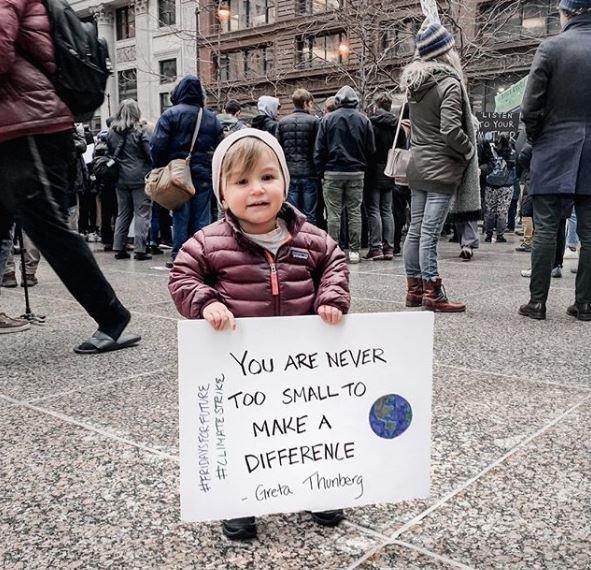
Image taken from the Facebook page"Moral Straw", a green virtual community
'Fridays for Future'
Greta Thunberg did not have an impact on kids only. Since her protest started, various websites around the world have been created as representative units of national phenomena of rebellion against climate change inaction, aiming at the common goal of establishing a green world. Also, pre-existing organizations have received major visibility and started acquiring new followers thanks to the relevance that the topic has managed to gain. The network society allowed those units to spread a message echoing in every corner of our globalized world, escalating in something never seen before as young students group up in squares instead of in their classrooms on Friday mornings to demonstrate their dissent against those who are not working to prevent this catastrophe from happening, keeping only their interests in mind.
The general dissatisfaction with ecological politics around the world allowed Greta Thunberg to take over and give voice to communities of people holding the same beliefs, united through the same goals. In the Netherlands, although the Prime Minister claims to be holding the greenest governement ever, he is actually talking about one of the most polluting countries in Europe. In response, 40.000 people of all ages marched in Amsterdam to protest against the government's policy. In France, besides a high school student movement, there is a call for signing a petition, aiming at reaching 3.000.000 signatures to ask for the prosecution of the French government for inaction against climate change. The video on the petition's website is sponsored by French actors and celebrities in an effort to capture the public's attention and, in a way, acquire some form of credibility, besides visibility. Straße des 17. Juni in Berlin welcomed the youngsters and their cause protesting in front of Brandenburger Tor, which has always hosted demonstrations taking place in the city as the monument represents Berlin's symbol of freedom. The 'Fridays for Future' movement is smaller in the US than it is in Europe because climate change in the US is not accepted as a fact. For this reason, Thunberg is currently travelling around the nation to spread the word to those who still do not hear it.
Dana Fisher, a sociologist at the University of Maryland defined the present movement as something that 'spans the developing-developed country divide. There aren’t that many issues that would unify in such a manner. And we all know the burden of climate change will fall on these kids’ shoulders when they are adults. They are acutely aware as well.'
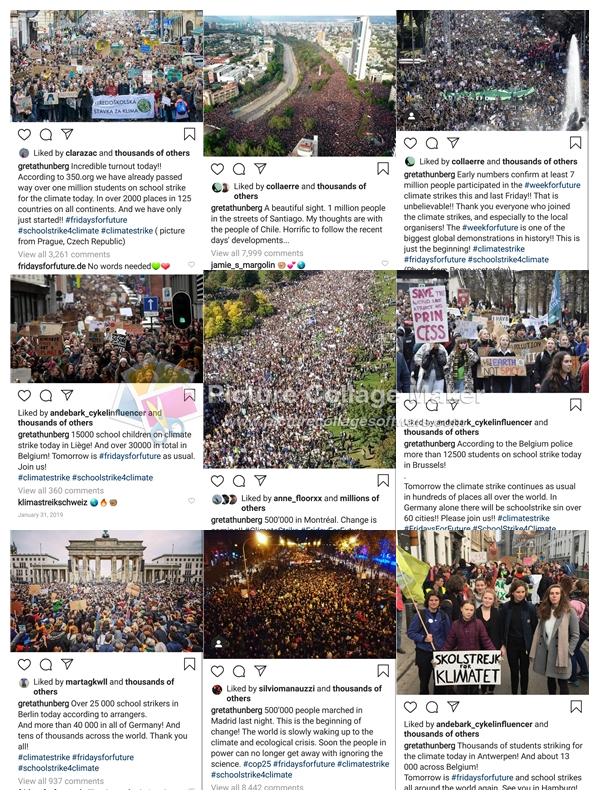
Collage of some of the most massively attended 'Fridays for Future' manifestations around the world
How the network society defines Greta Thunberg
Greta Thunberg's rise to fame can be analyzed through the analytical framework offered by Castells (2010) in his book The Rise of the Network Society. According to Castells, networks have become the predominant organizational form of every domain of human activity. Globalization has been intensified and diversified, communication technologies have constructed virtuality as a fundamental dimension of our reality. Because networking allows the exchange and flow of information, experience, opinions and perspectives, it trespasses every border and reaches every corner of the digitalized world. It is through social media that it has been made possible for Greta Thunberg to become known to the people who agree with her indignation towards the politics of production that have detrimental consequences for the environment. By becoming commonly known to them, Thunberg has given them a collective identity.
At the same time, through social media, Thunberg's image has been re-shaped in many different ways, as different images of her emerge, depending on who's posting. By searching #gretathunberg on Instagram, it is possible to get access to more than 355.000 posts. Not even half of those report something really connected to the young activist. In fact, the hashtag connects to posts related to plastic usage, the Amazon fire, vegan diets, ecologic products, small movements fighting against climate change, other kinds of messages connected to the cause promoted by the young activist, pictures of climate change around the world and many other environmental concerns. These posts use Thunberg's name as a hashtag to get more visibility and to associated themselves with her movement. Every action of Greta Thunberg's has been re-discussed and re-edited in order to produce alternative versions of who the young activist is besides the one she wanted to present. Below are some of these 'versions' of Greta Thunberg, which have been created mainly by Trump supporters.
Annoying
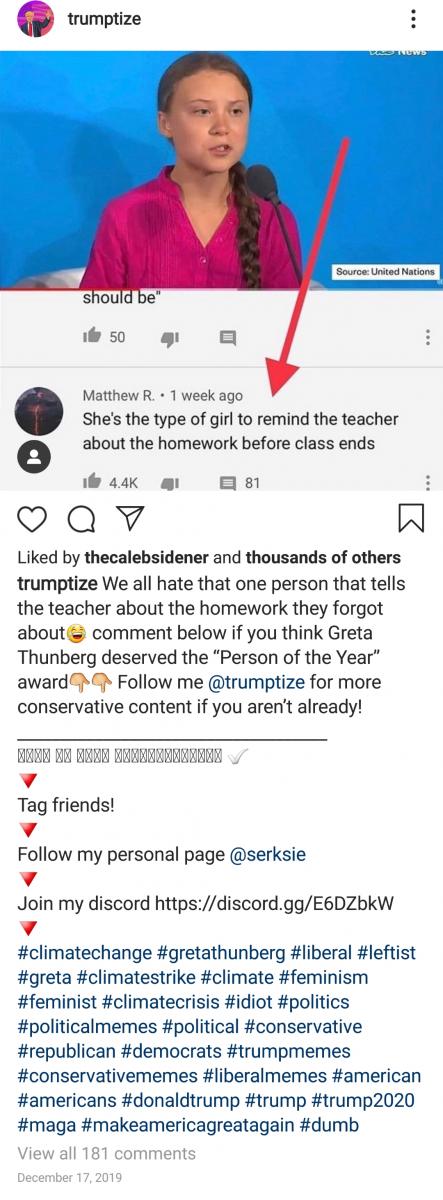
Screenshot of an Instagram post published by trumptize

Screenshot of an Instagram post published by trumptize
The meme above is one example of the way in which Greta Thunberg is perceived by audiences and represented by and for them. The young activist leader who stood up to bring a change to the world is often characterized as an annoying person who disturbs the attention of the public to turn it on important matters which we clearly want to ignore.
Posts such as the one above or others discussed below are all produced by people whose political orientation is made explicit through hashtags and Instagram names. Their main argument is that all ideas expressed by Thunberg are made up on fake bases and are only the result of the mind of a child who knows nothing about how the world works. Even though Greta Thunberg has claimed on many occasions that her protest does not have a political character but just aims at bringing everyone's attention to an issue which should be of public interest, politics could not be kept out of this matter. In fact, her underlying message on the importance of a scientific matter of common interest sheds light on the common dissatisfaction related to the present political governments around the world, escalating in a series of national protests. Her action also aims at convincing many governments to rediscuss previous accords made on CO2 emissions and the burning of fossil fuels. The main point of her protest has thus been turned into an anti-right wing protest by those who support it.
Angry
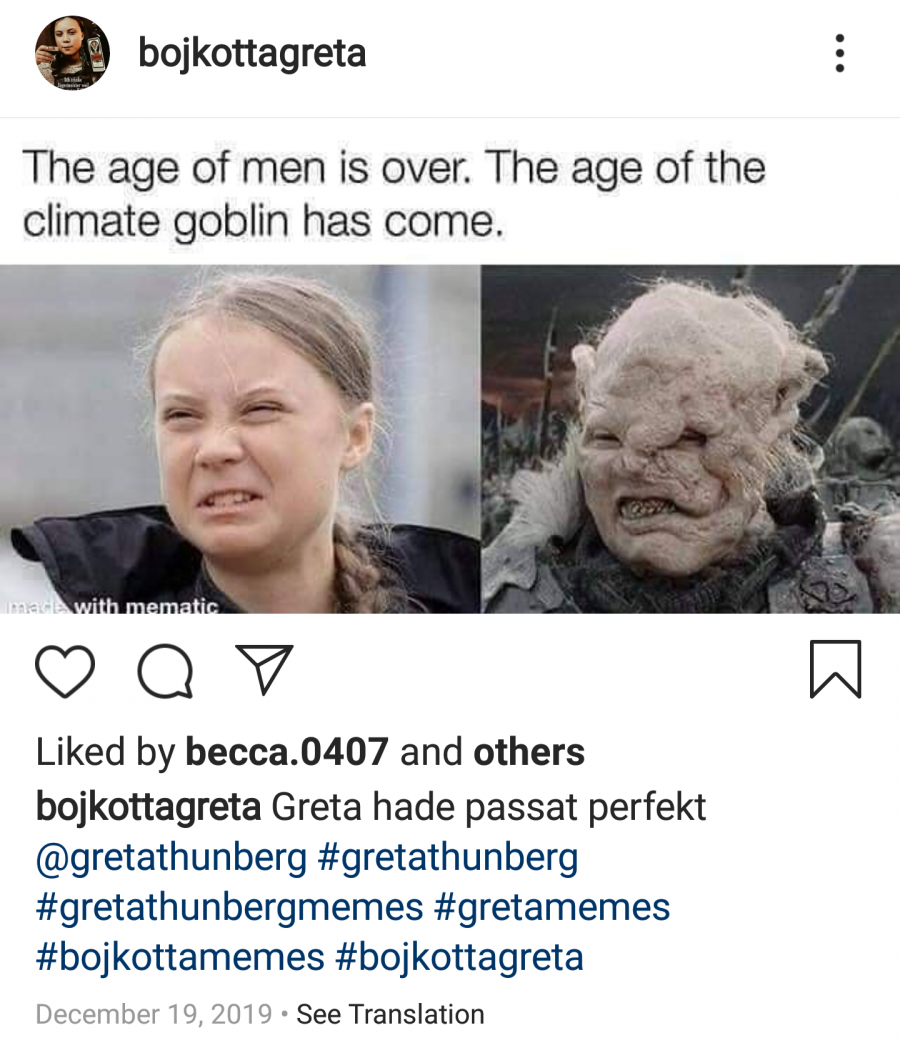
Screenshot of a meme found on Instagram, published by bojkottagreta
Greta Thunberg's face and her angry expressions have often been associated with horror movie characters or ugly monsters. Chucky the doll, Regan from The Exorcist, Smeagol from Lord of the Rings are only some examples taken from memes created to associate the image of the young activist to that of a disgusting entity with the aim to ridicule her. In the example above, Greta Thunberg is associated to the image of a goblin, a creature from Lord of the Rings that is similar to an orc.
When financial and political matters are at stake, figures like Thunberg have to be silenced in any possible way. Her anger is in fact represented as an unjustified mood for her to be in. Because those memes aim at focusing the attention of the public on how ridiculous her protest is, Greta Thunberg defends herself by claiming that adults should be worried about angry kids instead of laughing about them. She justifies her statement by pointing out that the heat levels of 2019 beat all previous records and therefore climate change cannot be denied anymore.
Manipulated
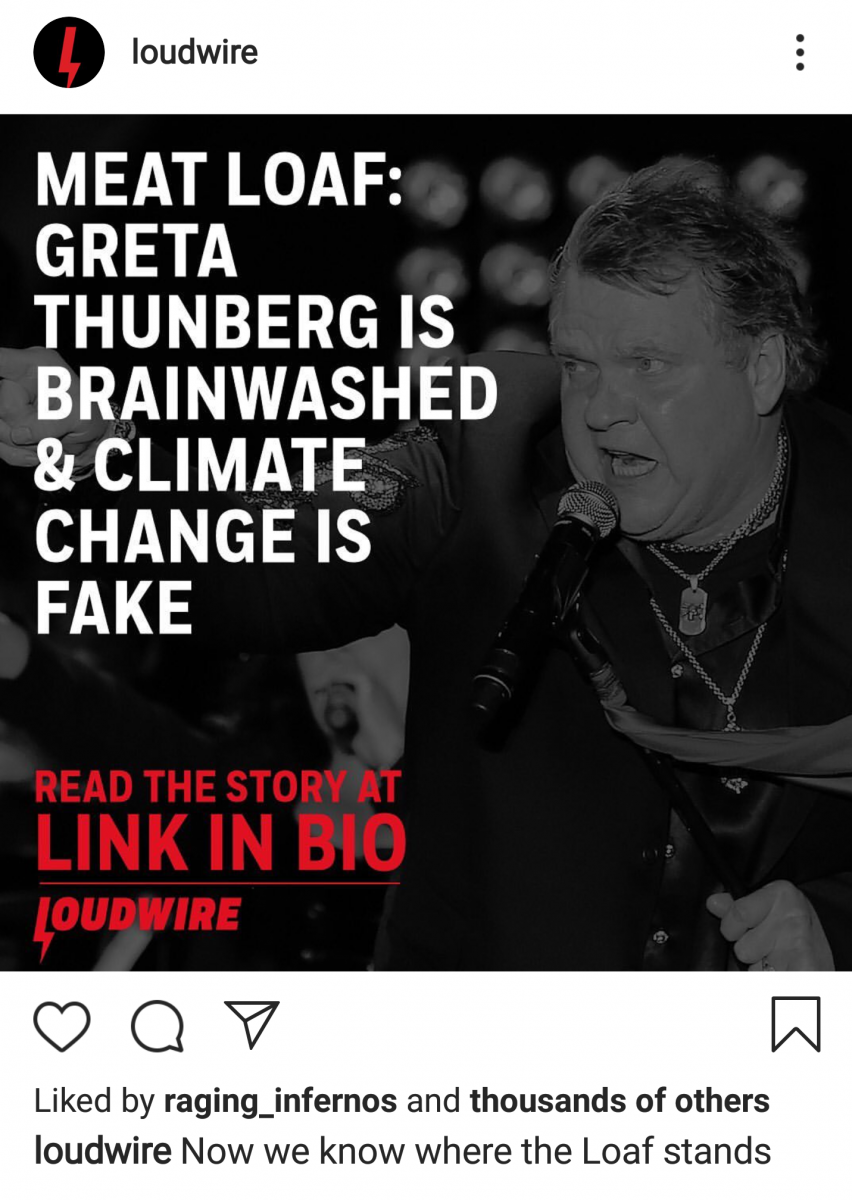
Screenshot taken from Instagram, from Loudwire's profile page
Another common opinion between those who antagonize her is that Greta Thunberg is manipulated. The girl is assumed to be exactly the same as any other kid of her age and it therefore seems impossible to many for a sixteen-year-old to have such a developed conscience about a matter of collective importance and about the repercussions human (in)action will have on the future of her generation and future ones. It seems fake to many that a young girl might be so conscentious, especially because many are not.
Meat Loaf, an American actor and singer (once again, a Trump supporter) has described Greta Thunberg as a brainwashed child, also claiming that climate change is fake (see post above). This statement shows that he does not only undermine the image of a girl who stood up for change, but he also attacks the truth of what she is actually trying to defend. The fact that Thunberg is continuosly labelled 'fake', especially when this is done by figures on the popular scene, influences the opinions of those who trust those figures, either in a positive or a negative way. There is an association of images and ideas influenced by opinions expressed by public figures on a matter. Because through social media they can display their preferences and values, celebrities can also use them as communication channels to influence their followers' taste and opinions. The idea that Greta Thunberg's actions are the result of adult thoughts is expressed also in the meme below.

Screenshot found on Instagram, posted by the page wemustendthefed
Why Greta Thunberg?
Many people before Thunberg, in remote parts of the world, took action against human-generated pollution. They, however, did not manage to become superstars. Their own identities and work were almost completely erased by Western media that rarely recognize progress outside their own part of the world - those activists were victims of media invisibility. 'So, I’m like, why Greta?', Joe Curnow, an assistant professor studying youth climate activism at the University of Manitoba asks. 'I think that has a lot to do with questions of race and racism', she continues. 'I think her whiteness is very much an asset for why the media, why governments, why the UN has been willing to feature her.'
Although in her most famous speech Thunberg angrily declares that her future has been stolen, she adds that she is one of the lucky ones. The possibility for her to bring about her protest and be heard at this scale is also a result of her circumstance. Among all who already took action to save the planet in their own way, her affluence, all the possibilities granted by her social status and the way she looks represent an advantage she has compared to her predecessors; it further stresses an already acknowledged inequality.
The popularity of the young activist has been enhanced and supported by various famous figures. Leonardo Di Caprio, for example, spent a day with her to discuss the importance of human actions to save the planet. In fact, not only does the actor support the cause, but he himself set up Earth Alliance, an environmental group aimed at collecting funds to help save the Amazon rainforest. His contribution to the cause amounted to 5 million dollars. Naturally, their meeting has inspired memes like the one below.
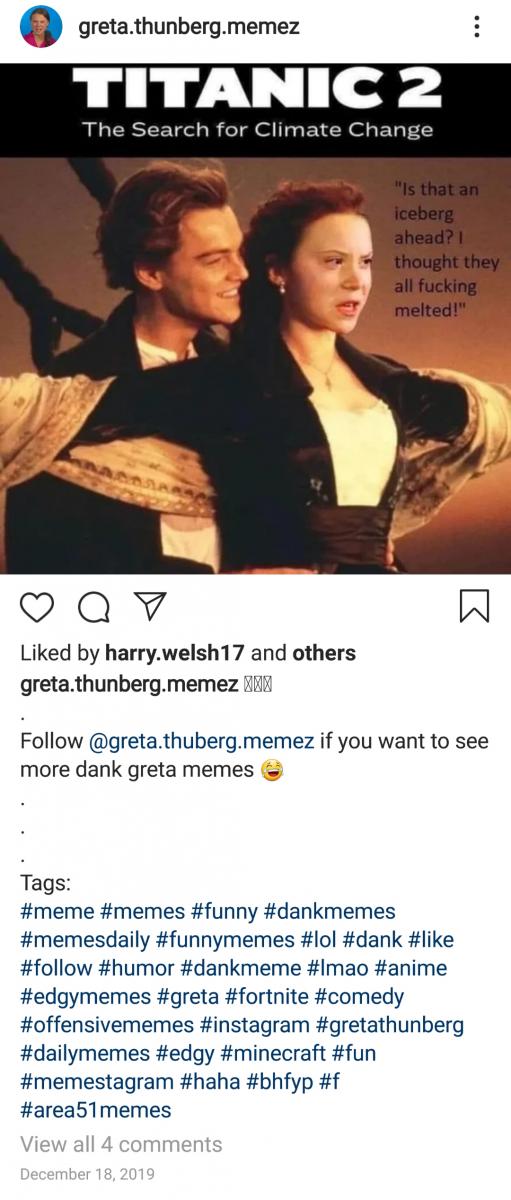
Screenshot of a meme found on Instagram, posted by the page greta.thunberg.memez
Barack Obama is also a big fan of Greta Thunberg. The former US president attempted in various ways to lead America in a green direction by limiting the ecological footprint of industries through reducing gas and other polluting emissions. On the 17th of September he met Greta Thunberg and shook her hand to show his support towards her fight to raise awareness about the topic.
The fact that personalities such as Obama or Di Caprio have met with the young activist or have publicly spoken about her also influence the way in which she is perceived by audiences. Their iconic roles and personalities reinforce and give importance to her figure, highlighting the value of her words and actions and reserving her a place in the spotlight. In this case, their already famous personalities reinforce the value of the action she is taking, contributing to the increase of her followers and supporters because of her affiliation with such prominent figures, who have already gained fame and trust among audiences.
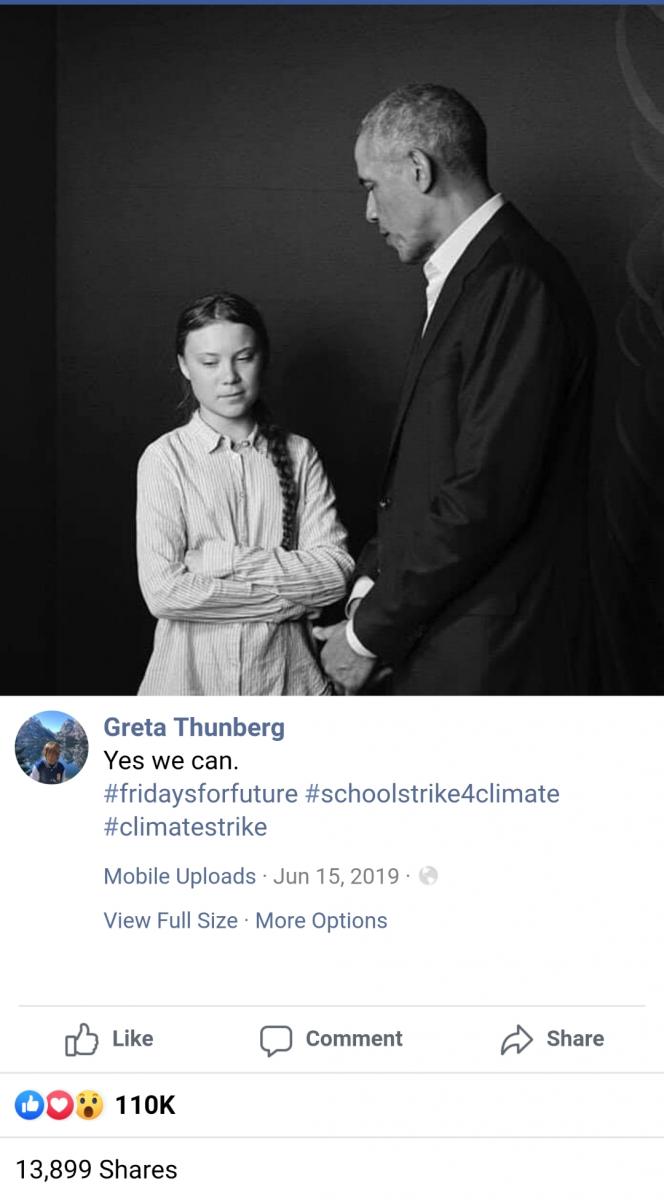
Screenshot of a picture taken at the first meeting between Greta Thunberg and Barack Obama, found on Greta Thunberg's Facebook profile.
The young activist is also a published author. She has written a book entitled 'No one is too small to make a difference', which has been out since November. The way in which Thunberg's words have resounded with the public is a threat to political elites, who are accused of being responsible for natural disasters. Being accused of the death of the planet and our environment does not sound like something to be proud of, especially when elections are near. Donald Trump, a notorious climate crisis denier, has his opinion about the matter always in the spotlight and has often gone viral through social media.
After Greta Thunberg gave her speech the 23rd of September at the Climate Summit, where Trump was not invited since he withdrew the US from the Paris climate agreement, he tweeted about Thunberg saying ironically that 'she seems like a very happy, young girl, looking forward to a bright and wonderful future'.
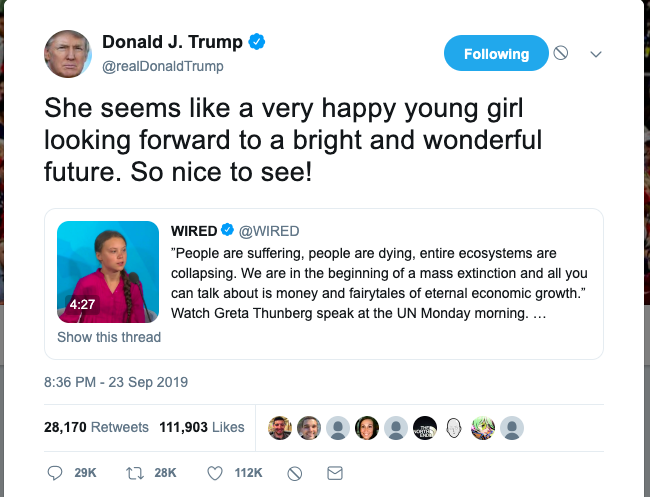
Screenshot taken from Trump's Twitter profile
This quote was copy-pasted by Greta Thunberg to be used as her Twitter bio as a way to demonstrate her awareness of how political figures portray her and her actions.
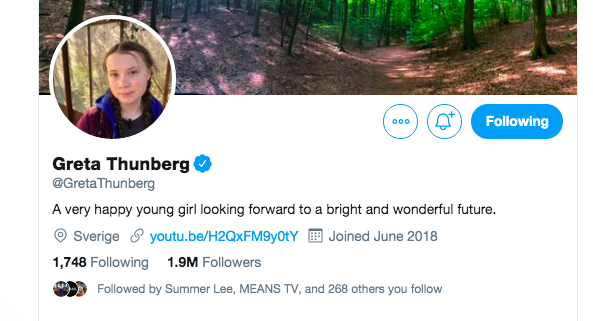
Greta Thunberg's Twitter profile after editing her personal description according to Trump's characterization
The dispute between the two had just started. On the 12th of December, the day after Thunberg was named 'Person of the year' by Time, the American president mocked her by tweeting the following message, which has again promptly been adopted by the activist as her short bio on Twitter.
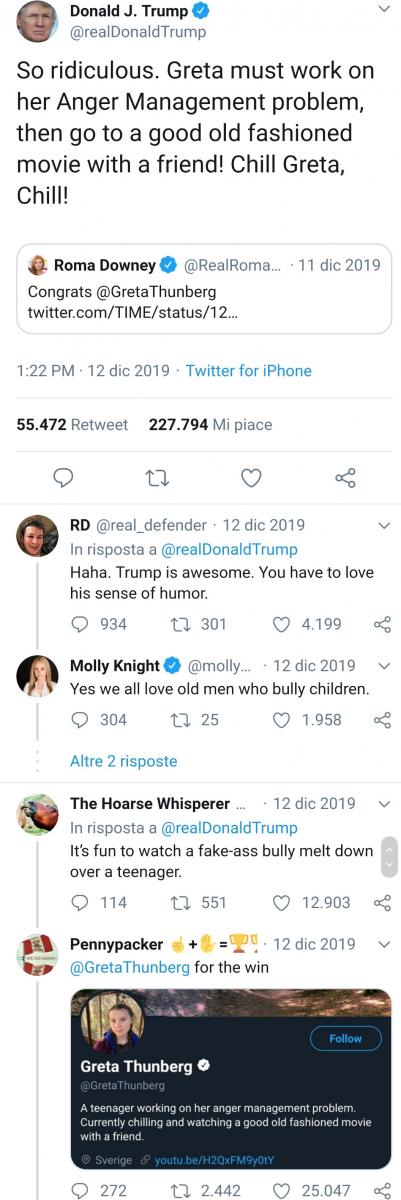
The New York Times counts 85 environmental rules and regulations on their way out under Mr. Trump. Because of this and because of the politics adopted by Trump as president more broadly, he is considered to be enemy number one to the young activist, therefore their activities on social media are always the subject of memes and posts which draw the attention of the public. This also helped the community of Greta's supporters to grow. Michelle Obama, for example, supported Greta Thunberg by posting on Twitter: 'Don't let anyone dim your light. Like the girls I've met in Vietnam, you have so much to offer us all. Ignore the doubters and know that millions of people are cheering you on'. The figure of Donald Trump and his use of social media are also contributing to creating an image of the young girl, shared by his supporters. At the same time, the feud is also discrediting his authority, shedding doubts on the quality of his leadership of the country and of his general conduct. In fact, Greta Thunberg has also had an array of political opponents of Donald Trump as supporters, such as Maxine Waters and famous journalists like Dan Rather, fighting on her side through Twitter posts.
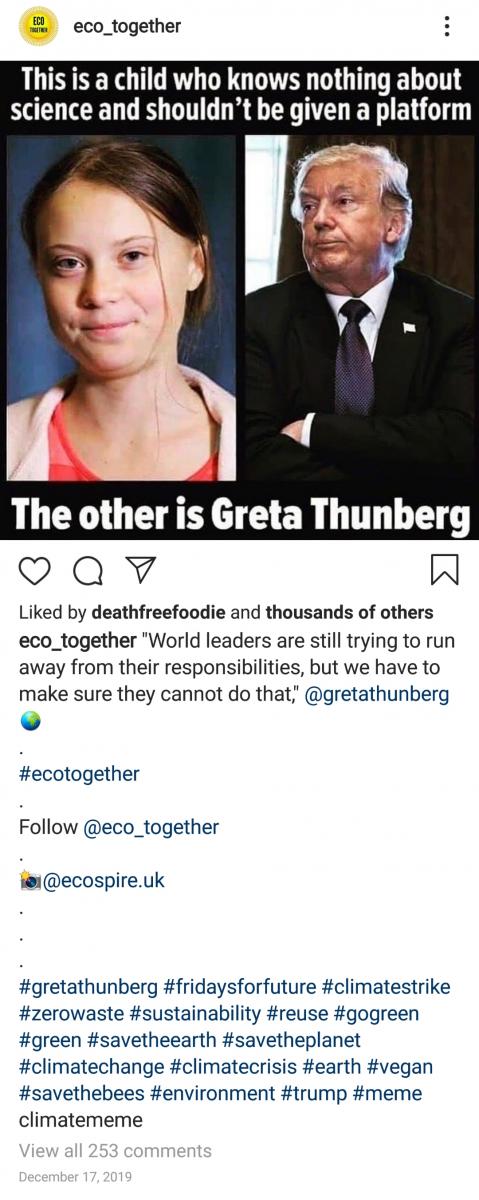
Screenshot of a meme found on Instagram published by eco_together
Greta Thunberg has often denied having any merit amongst the scientists who speak about climate change; her protest just aims at raising collective awareness towards a situation that should change for the collective good. Her courage and her determination are what helped her reach this goal. According to her mother, her stubbornness is also related to her being affected by Asperger's syndrome. As a result, the attention to the climate is not just a purpose for the common good to the young activist, but it is felt by her as a necessity, which increases her awareness of the real situation. Thunberg also claims that the truth of the facts should be explained in a realistic way for the people to understand the reality of the phenomenon.
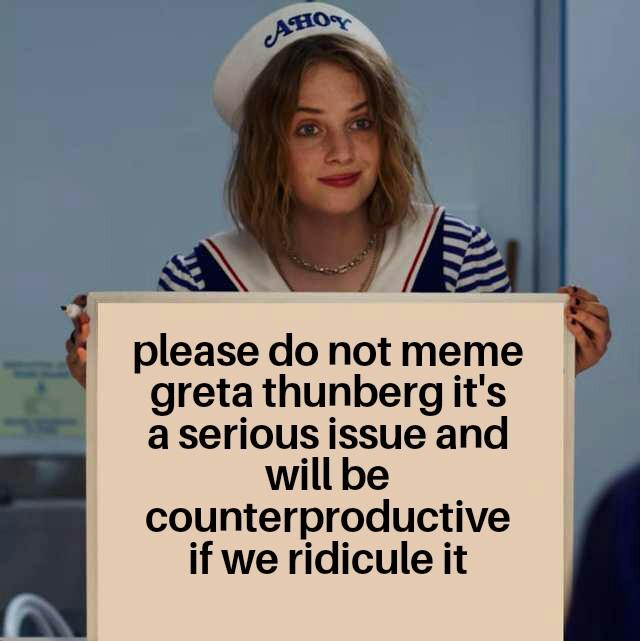
Meme found on Google, produced through a website specifically dedicated to memes
The above meme aims at addressing the topic of mocking Greta Thunberg on social media. The consequences of human (in)action when it comes to the environment have been ignored for too long; therefore, ridiculing her and underestating the truth of her claims does not help in solving the issue. The outcome of this would be to keep on ignoring a phenomenon which needs to be actively stopped. The aim of her protest was to raise awareness on a specific topic too long ignored by climate change denialists and all those politicians whose main interest has been economic growth to the detriment of our ecosystem.
A community of haters
It comes as no surprise that, after her speech at the UN Climate Action summit, Thunberg's community of haters grew. Laura Ingraham, a reporter for Fox News, has said things like 'honey, go back to school, it is gonna be okay' and compared Thunberg’s movement to 'Children of the Corn', a horror movie based on a Stephen King novel that features religious cult kids who murder the visitors of the city to sacrifice them to the will of God. 'I can’t wait for Stephen King’s sequel, ‘Children of the Climate’', says the journalist at the end of the report in which she presented Thunberg as 'the leader of a collective brainwash'. On the same day this coverage took place, Michael Knowles was invited to speak on Fox News. Once on air, he declared that the climate movement is not based on science arguing that, if it was, it would have been led by scientists rather than by politicians and a mentally ill Swedish child who has been exploited by her parents and by the international left.
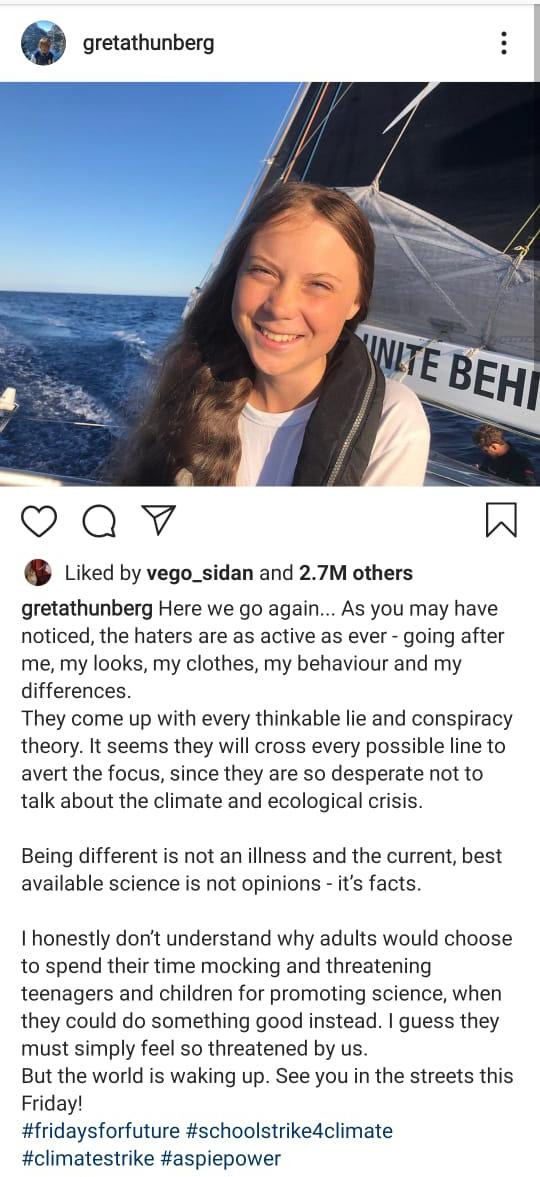
Screenshot taken from Greta Thunberg's Instagram page
On Facebook, different groups called 'Greta Thunberg memes' can be found, implying that she has become subject of viral memes widely on Facebook. The character of social media makes it possible to find the same memes and posts on every social network, ultimately constructing the image of the young activist in a heterogeneous way, always representing different perspectives of her and her activism, leaving it to the audience to make their choice - which is almost always conditioned by the content they can readily find.
Interestingly, online haters have also empowered Greta Thunberg's fight against the system. Opinions spread through social media do not affect the young activist, who claims she is strengthend by her diversity and will to keep on fighting against the evils of this economy-oriented world. Thunberg has defined her diversity as a superpower, which helps her achieve the goals she want to pursue. Her determination and dedication are the key elements that made her protest possible, giving a face to the largest-scale youth protest ever made for the sake of our planet. After all, haters just give her more visibility.
Greta Thunberg in the attention economy
In the digital world of the Network Society, public figures are defined not only by their actions but also by what the others say about them. This is also due to the fact that people often take the truth of what they read on social media for granted, without seeking additional information on the matter. By comparing different social media platforms, we can see their varying implications when it comes to the figure of Greta Thunberg. Her age, her gender, the fact that she is affected by Asperger's syndrome, the way in which she dresses and all other traits of her personal life have been put in the spotlight by the media with the purpose of silencing her protest by making her unpopular. Her personal traits are taken into account by those who want to discredit her and her opinion by making a fuss out of it. All her weaknesses are highlighted by those who see her as a threat for the normal course of economical and political progress.
The wide availability of media has allowed people to speak their mind on Thunberg's personality, regardless if good or bad, and in some occasions this helped reinforce the opinion of those who already dislike her, by spreading and justifying an ambivalent opinion about her. Equally relevant is the support Thunberg receives by public figures, which has political implications, influencing the matter which she wanted to be the real object of her action: leading to a political debate on a global scale. The importance of Thunberg's action and her success in stirring up debate is proven by the attention she receives on social media.
References
Castells, M. (2010). The Rise of the Network society. Blackwell Publishing Ltd, UK.